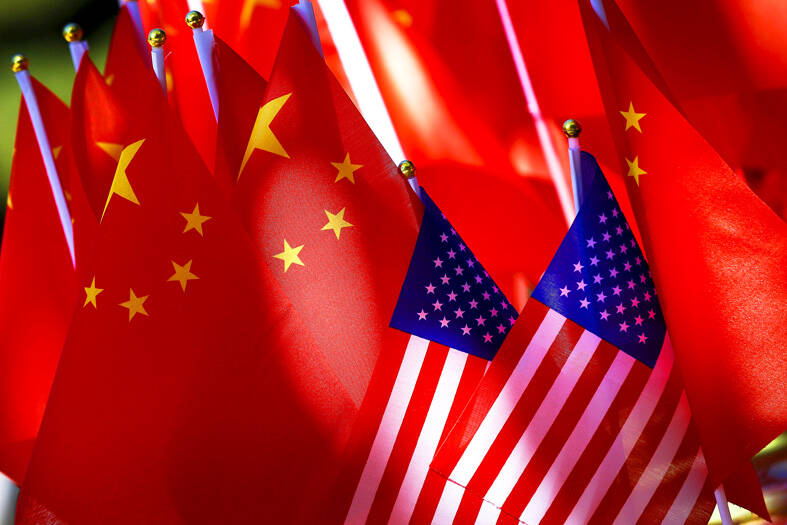US President Joe Biden’s administration believes China has implanted malware in key US power and communications networks in a “ticking time bomb” that could disrupt the military in the event of a conflict, the New York Times reported on Saturday.
The Times, quoting US military, intelligence and security officials, said the malware potentially gave the Chinese People’s Liberation Army the ability to disrupt US military operations if Beijing were to move against Taiwan at some point.
The affected systems could allow China not only to cut off water, power and communications to US military bases, but also to homes and businesses across the US, the newspaper said.

Photo: AP
The report comes two months after Microsoft Corp warned that state-sponsored Chinese hackers had infiltrated critical US infrastructure networks.
Microsoft singled out Guam, a US Pacific territory with a vital military outpost, as one target, but said that malicious activity had also been detected elsewhere in the US.
It said that the stealthy attack, carried out since mid-2021, was likely aimed at hampering the US in the event of a regional conflict.
Authorities in Australia, Canada, New Zealand and Britain warned at the same time that Chinese hacking was likely taking place globally, affecting an extensive range of infrastructure.
Discovery of the malware sparked a series of meetings in the White House Situation Room involving top military, intelligence and national security officials in an effort to track down and eradicate the code, the Times said.
The newspaper quoted one congressional official as saying that the malware operation amounted to “a ticking time bomb.”
The White House issued a statement on Friday that made no mention of China or military bases.
“The Biden administration is working relentlessly to defend the United States from any disruptions to our critical infrastructure, including by coordinating interagency efforts to protect water systems, pipelines, rail and aviation systems, among others,” National Security Council spokesman Adam Hodge said.
He added that Biden “has also mandated rigorous cybersecurity practices for the first time.”

AIR SUPPORT: The Ministry of National Defense thanked the US for the delivery, adding that it was an indicator of the White House’s commitment to the Taiwan Relations Act Deputy Minister of National Defense Po Horng-huei (柏鴻輝) and Representative to the US Alexander Yui on Friday attended a delivery ceremony for the first of Taiwan’s long-awaited 66 F-16C/D Block 70 jets at a Lockheed Martin Corp factory in Greenville, South Carolina. “We are so proud to be the global home of the F-16 and to support Taiwan’s air defense capabilities,” US Representative William Timmons wrote on X, alongside a photograph of Taiwanese and US officials at the event. The F-16C/D Block 70 jets Taiwan ordered have the same capabilities as aircraft that had been upgraded to F-16Vs. The batch of Lockheed Martin

GRIDLOCK: The National Fire Agency’s Special Search and Rescue team is on standby to travel to the countries to help out with the rescue effort A powerful earthquake rocked Myanmar and neighboring Thailand yesterday, killing at least three people in Bangkok and burying dozens when a high-rise building under construction collapsed. Footage shared on social media from Myanmar’s second-largest city showed widespread destruction, raising fears that many were trapped under the rubble or killed. The magnitude 7.7 earthquake, with an epicenter near Mandalay in Myanmar, struck at midday and was followed by a strong magnitude 6.4 aftershock. The extent of death, injury and destruction — especially in Myanmar, which is embroiled in a civil war and where information is tightly controlled at the best of times —

Taiwan was ranked the fourth-safest country in the world with a score of 82.9, trailing only Andorra, the United Arab Emirates and Qatar in Numbeo’s Safety Index by Country report. Taiwan’s score improved by 0.1 points compared with last year’s mid-year report, which had Taiwan fourth with a score of 82.8. However, both scores were lower than in last year’s first review, when Taiwan scored 83.3, and are a long way from when Taiwan was named the second-safest country in the world in 2021, scoring 84.8. Taiwan ranked higher than Singapore in ninth with a score of 77.4 and Japan in 10th with

SECURITY RISK: If there is a conflict between China and Taiwan, ‘there would likely be significant consequences to global economic and security interests,’ it said China remains the top military and cyber threat to the US and continues to make progress on capabilities to seize Taiwan, a report by US intelligence agencies said on Tuesday. The report provides an overview of the “collective insights” of top US intelligence agencies about the security threats to the US posed by foreign nations and criminal organizations. In its Annual Threat Assessment, the agencies divided threats facing the US into two broad categories, “nonstate transnational criminals and terrorists” and “major state actors,” with China, Russia, Iran and North Korea named. Of those countries, “China presents the most comprehensive and robust military threat